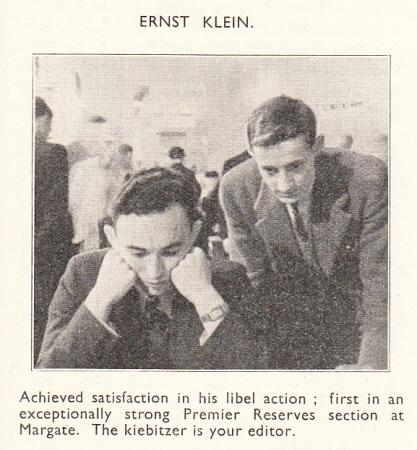
Edward Winter

A photograph caption on page 361 of CHESS, 14 June 1938 described Ernst Klein as having ‘achieved satisfaction in his libel action’, and the April 1940 issue of the same magazine (page 168) referred back to this matter:
‘One hundred years ago, chess masters used freely to print things about each other which would lead to an instant and successful libel action today. E. Klein, the ex-Austrian master, entered on such an action when most of the visiting chess masters at Margate, a couple of years ago, signed and published a petition complaining about his “unfair and obnoxious behaviour” and stating their unwillingness to have him competing with them ever again; and he obtained redress.’
The matter had been mentioned on page 269 of the 14 April 1938 CHESS, under the heading ‘Klein’s “Honour Vindicated”’:
‘Ernst Klein has withdrawn his libel action against Alekhine, Miss Menchik, Prins and a group of other masters, having obtained an apology, with indemnification for costs. He states that his “honour has now been vindicated”.’
An endnote on page 262 of Chess Explorations:
Pages 78-79 of CHESS, 14 November 1937 reported: ‘A writ claiming damages for alleged libel has been issued by Ernst Klein, the Austrian chess master now living at Clanricarde Gardens, Bayswater, against Dr Alekhine, Miss Menchik, G. Koltanowski, E. Cox, L. Prins, Reuben Fine, W.A.T. Schelfthout, S. Landau and G. van Doesburgh. ... The action is concerned with a document prepared at Margate during the Easter congress in which certain allegations were made concerning Mr Klein’s desirability as an opponent.’
(1602)
A quote from page 43 of E. Klein and W. Winter’s The Anglo-Soviet Radio Chess Match (London, 1947), the writer of the passage being Klein:
‘To my mind the days of a small super class like Lasker, Capablanca and Alekhine are gone for ever: these men were inventors. Now masters are merely technicians of varying skill and the question of the world title, which it would seem is causing some heart-burning, is really out of date.’
(2293)
Harrie Grondijs (Rijswijk, the Netherlands) draws attention to an illustration opposite page 288 of the May 1935 issue of El Ajedrez Español:
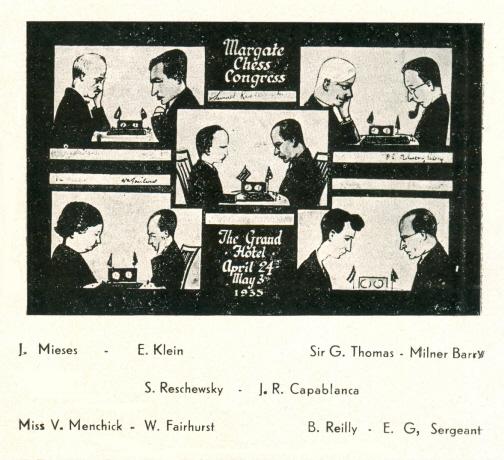
The mention of Ernst Klein (1910-90) prompts us to pose a quiz question: what connection did he have with a match for the world chess championship?
Klein appears on the far right of this group photograph, reproduced from page 2 of Staunton Centenary Tournament 1951 by H. Golombek (published in London later that year).
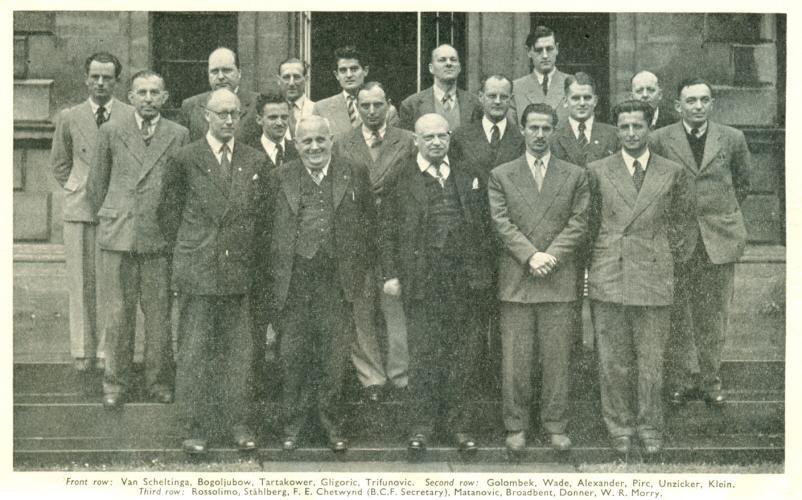
(5202)
In his column in The Times, 18 February 1978 (page 13) Harry Golombek wrote:
‘It looks as though the first world championship match in which there were seconds whose official duty it was to aid their principals in analysis during adjournments was the 1935 Alekhine-Euwe match in the Netherlands. Alekhine’s second was the Dutch master Landau, and Euwe had the Hungarian grandmaster Maróczy as his second.’
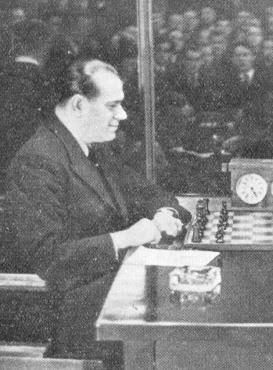
Salo Landau
However, in a letter to the newspaper published on 11 March 1978 (page 13) Ernst Klein wrote:
‘The facts are as follows: Landau helped Euwe and I helped Alekhine. Landau and myself were designated “trainers”.’
Golombek quoted those words in his column of 18 March 1978 (page 10) and commented:
‘Fortunately my library is pretty rich in journals and magazines for the period in question, and I also have no less than five books dealing solely with the match.
An examination of these works shows that there is no substance whatsoever for Mr Klein’s correction of my statement that Landau was Alekhine’s second and Maróczy Euwe’s.’
After quoting from various contemporary sources, Golombek concluded:
‘All this would seem to show that Mr Klein has got his recollections of this famous match in a most inglorious muddle. Possibly he did give Alekhine some unofficial help during the last few games of the match, but he never served in any official capacity at any time in the contest.’
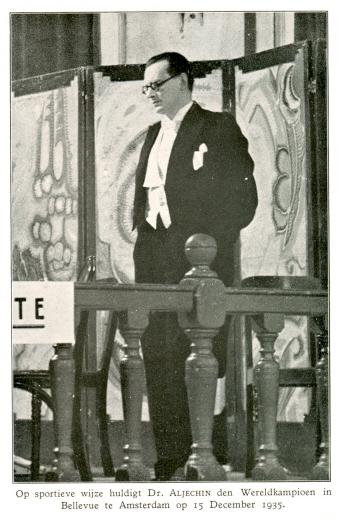
Golombek returned to the subject in his column of 8 April 1978 (page 12) after verifying the facts with Euwe, who informed him:
‘You are right: Maróczy was my second and Landau was Alekhine’s second during the 1935 WC Match. But after the 26th or the 27th game Landau withdrew after a disagreement with Alekhine. In the remaining games Mr Klein helped Alekhine, but he had no official status.’
Golombek evidently did not consult Max Euwe Biografie van een Wereldkampioen by Alexander Münninghoff, Max Euwe and Jules Welling (Amsterdam-Antwerp, 1976). Pages 184-185 discussed Klein’s brief, controversial involvement as Alekhine’s ‘trainer’. (See also pages 134-136 of the English edition, published in 2001.) What else is known about Klein and the 1935 world championship match, and particularly from contemporary sources?
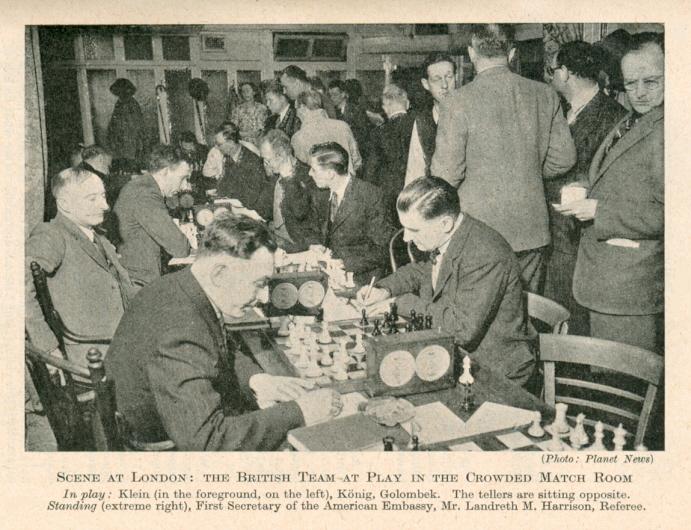
A photograph from The
Anglo-Soviet Radio Chess Match by E. Klein and W. Winter
(5214)
From Steve Wrinn (Homer, NY, USA):
‘With regard to Ernst Klein and his involvement with the 1935 world championship match, and in particular his expulsion from the playing-hall during the 28th game, here are two quotes from books on that match.
1) The first comes from Recueil des parties du championnat du monde (Alekhine-Euwe) 1935, (Brussels, undated). The introduction to the 28th game (page 82) strongly suggests that Klein’s status as Alekhine’s “trainer” was unofficial:
“La fièvre monte. Le maître Alekhine, avec les Noirs, joue une variante suggérée par Spielmann et développée par le jeune maître viennois Klein, qui vient d’en faire une étude approfondie durant une huitaine de jours, suivant ses propres déclarations. Sans motifs apparents, le maître Klein se trouve aux côtés de l’ancien champion du monde. Au quinzième coup, Alekhine estimant sa position satisfaisante va serrer la main de celui que l’on a nommé – peut-être à tort – son ‘entraîneur’; ce geste soulève un incident au cours duquel le maître viennois est prié de quitter les lieux indûment occupés par lui.”
2) Hans Kmoch, in his Tagebuch vom Wettkampf Aljechin-Euwe (Vienna 1936), does not mention Klein by name but does refer to an incident during the 28th game in which a young chess master was asked to leave the playing-hall. The result was physical violence and police intervention. On pages 70-71 Kmoch wrote:
“Im Laufe des Abends ereignete sich leider ein unerfreulicher Zwischenfall. Ein junger Mann, ein Ausländer, Schachspieler mit beginnendem Renommee, dem Wettkampf mit Pressekarte beiwohnend, widersetzte sich hartnäckig einer Anweisung des Komitees, obwohl die diesbezügliche Pflicht auf den Pressekarten ausdrücklich vermerkt stand und für den Widersetzungsfall der Entzug der Pressekarte angedroht wurde. Als sich nun der Besagte durchaus nicht fügen wollte, wurde er von einem Mitglied des Komitees aufgefordert, seine Pressekarte abzuliefern und das Gebäude zu verlassen. Diese Aufforderung beantwortete der Unglückselige damit, daß er den betreffenden Herrn mit der Faust ins Gesicht schlug. Der “rasende Reporter” wurde schließlich polizeilich abgeführt.
Der peinliche Vorfall spielte sich zwar unter Ausschluß der Oeffentlichkeit ab, gelangte aber doch in die Presse und konnte daher an dieser Stelle nicht übergangen werden.”
That last sentence leads me to believe that more information on the incident may well be available in contemporary sources, particularly in the Netherlands.’
(5281)
Pascal Losekoot (Soest, the Netherlands) has found the following news report in the evening edition of Het Vaderland, 9 December 1935, page A:
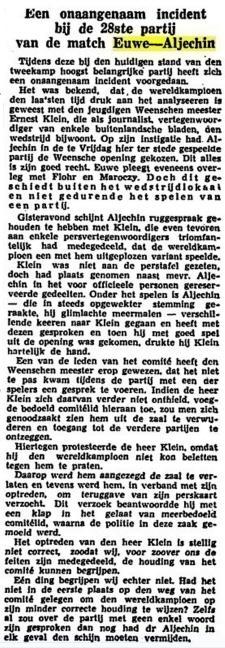
Our correspondent’s English translation is given below:
‘An unpleasant incident during the 28th game of the Euwe-Alekhine match
During this very important (given the current situation of the match) game an unpleasant incident occurred.
It is known that the world champion has been analysing lately with the young Viennese master Ernest Klein, who is representing several foreign papers as a journalist and is therefore attending the match. In Friday’s game in this city [The Hague – the 27th match-game] Alekhine played, at Klein’s instigation, the Vienna Opening. This he is fully entitled to do. Euwe consults with Flohr and Maróczy. However, that happens outside the playing-room and not while a game is being played.
It seems that yesterday evening Alekhine consulted with Klein, who had just previously told other press representatives that the world champion was playing a variation analysed with him.
Klein was not sitting at the press-table; he had taken his seat in the area reserved for officials. During play, Alekhine, who became more and more excited – he smiled several times – went to Klein on more than one occasion and talked to him, and when he had entered the middle-game with a good position he shook hands warmly with Klein.
One of the Committee members pointed out to the Viennese master that it is improper to talk to a player during the game. If Klein would not stop doing so, the Committee member added, the Committee would have no option but to expel him from the playing-hall and forbid him access to the other games.
Klein protested that he could not stop the world champion talking to him.
As a result, he was told to leave the room and to hand in his press-card. This request he answered by slapping the official’s face, after which the police became involved.
Mr Klein’s conduct is clearly not correct, so we can – as far as we are able to judge from the facts – understand the Committee’s reaction.
However, there is one matter that we do not understand. Should not the Committee have first informed the world champion of his incorrect behaviour? Even if not a word was spoken about the game, Dr Alekhine should have prevented anyone from thinking otherwise.’
(5326)
George M. Prescott Jr (Newport, RI, USA) notes that also on 9 December 1935 a report on the Klein matter was published on page 11 of section six of the evening edition of De Telegraaf.
Ernst Klein – Olaf Barda
Radio game (BBC-NRK), 1952
King’s Fianchetto Opening
1 g3 d5 2 Bg2 Nf6 3 f4 c5 4 Nf3 Nc6 5 c3 e6 6 d3 Qc7 7 O-O Be7 8 e4 dxe4 9 dxe4 Nxe4 10 Ne5 Nd6 11 Nxc6 bxc6 12 Qa4 O-O 13 Be3 Rb8 14 b3 Nb5 15 Rc1 Rd8 16 Qe4 Rd5 17 Qc2 Bb7 18 Qf2 Nd6 19 g4 f5 20 c4 Rd3 21 g5 Rd8 22 Nc3 Bc8 23 Na4 Ne4 24 Bxe4 fxe4 25 Nb2 R3d4 26 Re1 Rf8 27 Bxd4 Rxf4
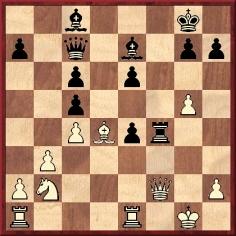
28 Rxe4 Rxe4 29 Rf1 Bd6 30 Be3 Bxh2+ 31 Kg2 Bd6 32 Qf3 Rh4 33 Rh1 Rxh1 34 Kxh1 Qf7 35 Kg2 Bd7 36 Qd1 Qe7 37 Qf3 e5 38 Qe4 Qe6. At this point White withdrew.
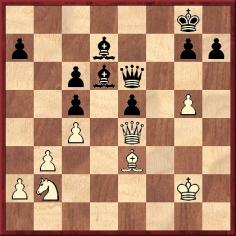
‘One of the finest games of chess ever played’ was the description on page 155 of the July 1952 Chess World. The same page had derision for Klein’s suggestion that in the final position he had a won game.
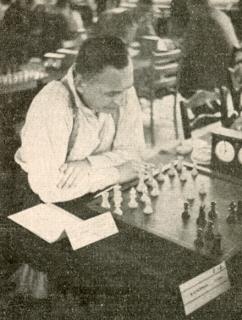
Ernst Klein
Coverage of the game and of Klein’s controversial withdrawal was published in three issues of CHESS: July 1952, page 191 (report); August 1952, pages 218-219 (letter from Klein) and 222-223 (annotations by Barda); September 1952, page 237 (letter from Klein).
(5510)
From Tony Klein (Uppsala, Sweden):
‘My father Ernst Ludwig Klein was never particularly voluble about his past, so what I have to tell is a combination of fragmentary memories of our conversations and biographical information which has become available to me since his death.
He was born in Vienna on 29 January 1910 and died in Southend-on-Sea on 22 August 1990. His father died of cancer when he was eight, and his mother died of tuberculosis when he was 18. He had a sister, three years older, who emigrated to the United States in 1938.
His paternal grandfather was a prominent Viennese eye surgeon, Salomon Klein, originally from the Hungarian town of Miskolc in the then Austro-Hungarian Empire. His textbook on opthalmology from 1879 has recently been reprinted.
My father’s maternal great-grandmother was Lina Morgenstern (1830-1909), well known in Berlin for her work with soup kitchens, her cookery books, and her progressive writings on kindergarten pedagogics and women’s education.
His maternal grandmother, Else Roth, a resourceful, dynamic and “very Prussian and stern” widow with whom he lived from the age of eight to 11, was also an author, of both cookery books and manuals on woodwork and metalwork, and a pioneer in the introduction of some Swedish concepts of physiotherapy to Germany, after a visit to Stockholm in 1885. My father initially learned chess from Else Roth while living with her.
[Correction from Mr Tony Klein received on 26 December 2015: ‘My father's maternal grandmother, the daughter of Lina Morgenstern, was Clara (and not Else) Roth née Morgenstern, and my father’s mother, my paternal grandmother, was Clara’s daughter Else Klein née Roth (1884-1928).’]
Bedridden for a long time from the age of 14, after a knee injury and consequent serious bone infections which in effect broke off his school education, he also learned chess from a paternal uncle, Victor Klein, who, as I remember my father telling me, had been a Viennese master, although I have traced no information about that. Victor Klein later emigrated to the United States and, I believe, practised gynaecology in New York. I possess a letter which he wrote from the United States to my father during the early 1950s, but unfortunately I have no further details about Victor Klein’s chess career.
Of my father’s chess career before his arrival in England I have sparse information, but it is recorded that he played in tournaments in Vienna, as well as at Győr, 1930. I do know that he lived a wandering kind of life from the age of 18 to 25, when he finally settled in England. Travelling and living in Switzerland, France, Italy and the Netherlands, financially supported, as he said, by a wealthy uncle, he occupied himself exclusively with chess. As I remember, Tartakower and Emanuel Lasker were among those with whom he associated. He played simultaneous blindfold exhibitions; at least one, in Italy, was apparently against 11 boards, although I have no documentation.
Around the age of 18 he had spent some time in a Swiss sanatorium for treatment of his osteomyelitis, the infection which he had contracted in his childhood and which became a persistent affliction that dogged him on and off for the rest of his life, rendering him somewhat lame, obliging him to walk with a stick and in constant pain. In the sanatorium in Switzerland he also learned bridge, and I believe that he became a reasonably good bridge player and continued to play socially well into old age.
Ernst Klein (BCM, June 1935, page 258)

From CHESS, 14 June 1938, page 361. (See Chess in the Courts.)
He had acquired a second profession – mathematics – by studying for a degree on his own in London during the Second World War, and this was his major occupation from the mid-1950s until his retirement in 1970. Both chess and mathematics were arts rather than sciences, he would always say, although very late in life he admitted to me that he had reluctantly realized that chess is simply about winning against an opponent.
He tried to teach me chess when I was a child. I say “tried”, as I disappointed him by not wanting to study the game in books, and he said, rather unpedagogically, that as long as I did not I was only “playing”. However, I am proud to say that I did manage to win against him when he played with a queen handicap. We often used to play the game of Nine Men’s Morris (called Mühle in German) and had long games at which we were quite evenly matched.
His own account of the 1935 Alekhine-Euwe match incident (discussed in C.N.s 5214, 5281 & 5326) was that he felt betrayed by Alekhine when the latter congratulated, or thanked, him, openly and quite inappropriately. He never even intimated the story of unacceptably violent behaviour on his own part during the incident in question. He maintained a bitter grudge against Alekhine, while never uttering anything but unreserved admiration for his stature as a chess genius.
My father easily took offence and had a short, explosive temper. Despite my personal knowledge of him, I was shocked to read of the complaints made against him in 1935, and I have no specific idea upon what they were based.
Ernst Klein. Source: page 15 of The Anglo-Soviet Radio Chess Match by E. Klein and W. Winter (London, 1947)
My clear impression is that his withdrawal from competitive chess shortly after winning the British championship in 1951 resulted from his personal inability to handle adequately the vicissitudes of a competitive and often internecine world.
I was unaware of his modest return to chess in the early 1970s until I happened to find among his chess literature an account of the London Chess Club Invitation Tournament of 1973, reviewed by Leonard Barden, where my father was apparently the veteran of the tournament and received praise for his stamina, and for playing two of the finest games in the event. I quote from pages 9-10:
“We were very pleased to welcome Ernest Klein for his first tournament since he won the British championship at Swansea 1951. It can’t have been easy for him; at 63, he was the oldest player by more than 20 years and facing a stamina-sapping two rounds a day schedule. Yet his wins over Goodman and Kinlay, achieved with youthful élan, were among the best games of the tournament, while against Markland he found an interesting improvement over the game Fischer-Rubinetti, Buenos Aires, 1970, by 10...Nf6 (Rubinetti chose 10...Bd6) followed by the regrouping manoeuvre with the KR and KN. It was a loss for British chess when Klein gave up active play; quite apart from his tournament achievements, his book on the Anglo-Soviet radio match of 1946 is a model of lucid annotation.”
I feel that I have some particularly valuable legacies from my father, which I see as congruent with both his chess and his mathematical careers. He instilled in me the adage that “a thing worth doing is worth doing well”. He inspired and educated me to approach a problem by always thinking for myself, “from first principles”, rather than relying on pre-existent, often mechanical, methods. He also taught me by example to express myself clearly in writing.’
Tony Klein has provided copies of pages from his father’s edition of the monograph on the 1973 tournament, and we reproduce the biographical note on him, as well as the three games mentioned in the above quote (from, respectively, pages 19, 28, 32 and 44):

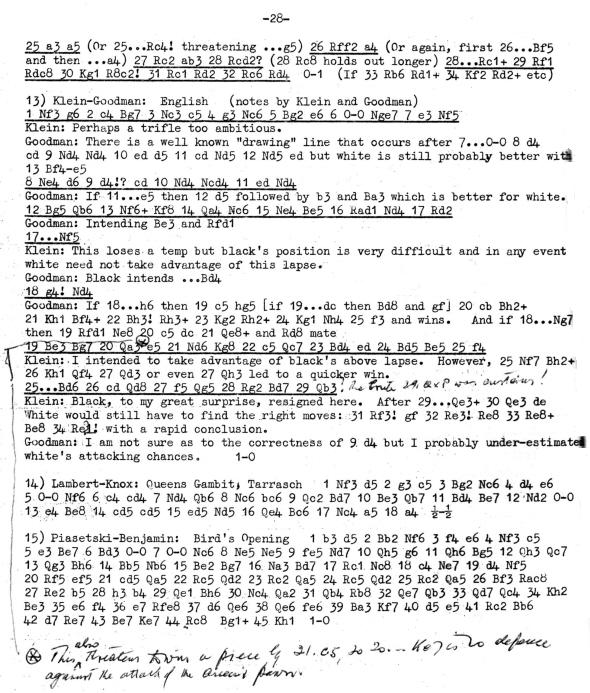

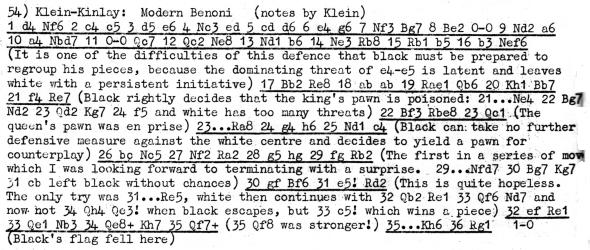
Ernst Ludwig Klein – David Goodman
London, September 1973
English Opening
1 Nf3 g6 2 c4 Bg7 3 Nc3 c5 4 g3 Nc6 5 Bg2 e6 6 O-O Nge7 7 e3 Nf5 8 Ne4 d6
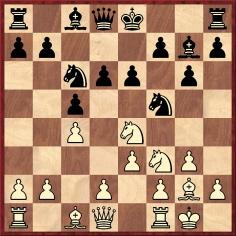
9 d4 cxd4 10 Nxd4 Ncxd4 11 exd4 Nxd4 12 Bg5 Qb6 13 Nf6+ Kf8 14 Qa4 Nc6 15 Ne4 Be5 16 Rad1 Nd4 17 Rd2 Nf5 18 g4 Nd4 19 Be3 Bg7 20 Qa3 e5 21 Nxd6 Kg8 22 c5 Qc7 23 Bxd4 exd4 24 Bd5 Be5 25 f4 Bxd6 26 cxd6 Qd8 27 f5 Qg5 28 Rg2 Bd7 29 Qb3 Resigns.
Peter Markland – Ernst Ludwig Klein
London, September 1973
Ruy López
1 e4 e5 2 Nf3 Nc6 3 Bb5 a6 4 Bxc6 dxc6 5 O-O f6 6 d4 Bg4 7 dxe5 Qxd1 8 Rxd1 Bxf3 9 gxf3 fxe5 10 Be3
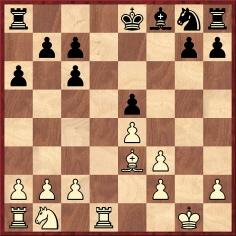
10...Nf6 11 Nd2 Nd7 12 Nc4 Be7 13 Kf1 Rf8 14 Ke2 Rf6 15 Rd3 Re6 16 Rad1 Nf8 17 c3 a5 18 Rg1 Ng6 19 a4 b5 20 Nd2 Rb8 21 Ra1 bxa4 22 Nc4 a3 23 bxa3 a4 24 Rdd1 Rb5 25 Rdb1 Nf4+ 26 Bxf4 exf4 27 Nb2 Rh6 28 Nxa4 Rxh2 29 Nb2 Rb3 30 Nd3 Rxc3 31 Rc1 Rxa3 32 Rxa3 Bxa3 33 Rxc6 Kd7 34 Ra6 Be7 35 Nxf4 Bc5 36 Nd3 Bb6 37 Ra1 Rh5 38 Rg1 g6 39 f4 Ke7 40 Nb4 Bc5 41 Nd5+ Kd6 42 Rd1 Kc6 43 Rc1 Rh2 44 Nxc7 Rxf2+ 45 Ke1 Rh2 46 Ne6 Rh1+ 47 Kd2 Rxc1 48 Kxc1 Be3+ 49 Kd1 Kd6 50 Ke2 Bc1 Drawn.
Ernst Ludwig Klein – Jonathan Kinlay1 d4 Nf6 2 c4 c5 3 d5 e6 4 Nc3 exd5 5 cxd5 d6 6 e4 g6 7 Nf3 Bg7 8 Be2 O-O 9 Nd2 a6 10 a4 Nbd7 11 O-O Qc7 12 Qc2 Ne8 13 Nd1 b6 14 Ne3 Rb8 15 Rb1 b5 16 b3 Nef6 17 Bb2 Re8 18 axb5 axb5 19 Rbe1 Qb6 20 Kh1 Bb7 21 f4 Re7 22 Bf3 Rbe8 23 Qc1 Ra8 24 g4 h6 25 Nd1 c4 26 bxc4 Nc5 27 Nf2 Ra2
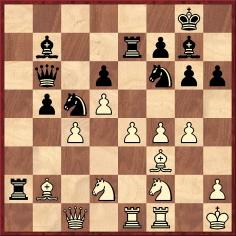
28 g5 hxg5 29 fxg5 Rxb2 30 gxf6 Bxf6 31 e5 Rxd2 32 exf6 Rxe1 33 Qxe1 Nb3 34 Qe8+ Kh7 35 Qxf7+ Kh6 36 Rg1 and Black lost on time.
(7725)
From page 127 of CHESS, 14 January 1956:
‘E. Klein, who was not consulted about the title of British Master which the BCF announced it had awarded him, has declined to accept the title.’
Further to the controversy involving Ernst Klein and the 1935 Alekhine v Euwe world title match, Alan McGowan (Waterloo, Canada) notes two more items:
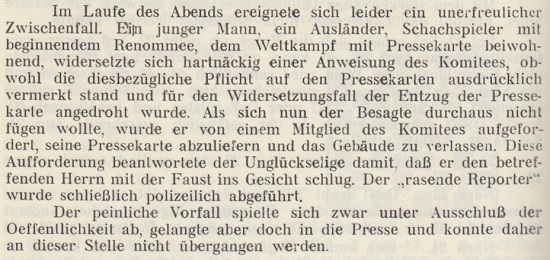
Wiener Schachzeitung, April 1936, page 104
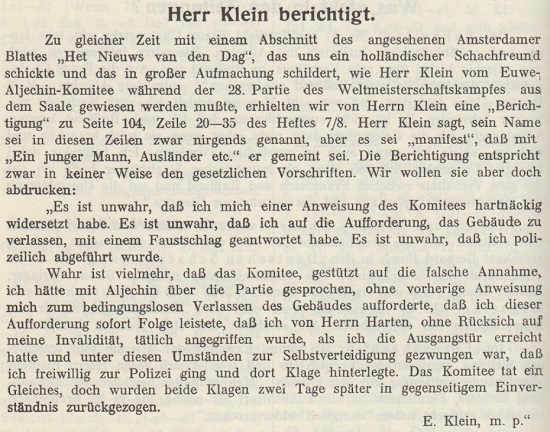
Wiener Schachzeitung, June 1936, page 188.
(9240)
To the Chess Notes main page.
To the Archives for other feature articles.
Copyright: Edward Winter. All rights reserved.